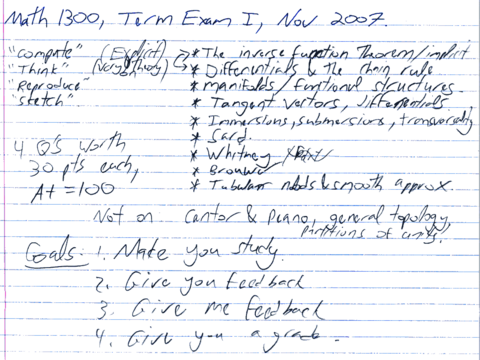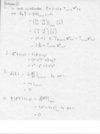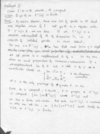0708-1300/Term Exam 1: Difference between revisions
No edit summary |
|||
| (6 intermediate revisions by 2 users not shown) | |||
| Line 1: | Line 1: | ||
{{0708-1300/Navigation}} |
{{0708-1300/Navigation}} |
||
Term Exam 1 |
Term Exam 1 took place on Thursday November 8, 2007, at 6PM, at Sydney Smith 1084. |
||
=={{Dror}}'s Internal Notes== |
|||
[[Image:0708-1300-Term Exam I Plan.png|center|480px]] |
|||
==The Exam== |
|||
===Front=== |
|||
<center> |
|||
'''Do not turn this page until instructed.''' |
|||
'''Math 1300 Geometry and Topology''' |
|||
'''Term Test''' |
|||
''University of Toronto, November 8, 2007'' |
|||
Solve the 4 problems on the other side of this page. |
|||
Each problem is worth 30 points. |
|||
You have two hours to write this test. |
|||
</center> |
|||
'''Notes.''' |
|||
* No outside material other than stationary is allowed. |
|||
* '''Neatness counts! Language counts!''' The ''ideal'' written solution to a problem looks like a page from a textbook; neat and clean and made of complete and grammatical sentences. Definitely phrases like "there exists" or "for every" cannot be skipped. Lectures are mostly made of spoken words, and so the blackboard part of proofs given during lectures often omits or shortens key phrases. The ideal written solution to a problem does not do that. |
|||
<center>'''Good Luck!'''</center> |
|||
===Back=== |
|||
'''Solve the following 4 problems.''' Each problem is worth 30 points. You have two hours. '''Neatness counts! Language counts!''' |
|||
'''Problem 1 "Compute".''' Let <math>\phi:{\mathbb R}^2_{x,y}\to{\mathbb R}^2_{u,v}</math> be given by <math>u(x,y)=x^2-y^2</math> and <math>v(x,y)=2xy</math>, let <math>f:{\mathbb R}^2_{u,v}\to{\mathbb R}</math> be given by <math>f(u,v)=u^2+v^2</math>, and let <math>\xi\in T_{(0,1)}{\mathbb R}^2_{x,y}</math> be <math>\xi=\partial/\partial x</math>. Compute |
|||
the following quantities (with at least some justification): |
|||
# <math>\phi_\star\xi</math>. |
|||
# <math>\phi^\star f</math>. |
|||
# <math>(\phi_\star\xi)f</math>. |
|||
# <math>\xi(\phi^\star f)</math>. |
|||
'''Problem 2 "Reproduce".''' The tangent space <math>T_0{\mathbb R}^n</math> to <math>{\mathbb R}^n</math> at <math>0</math> can be defined in the following two ways: |
|||
# <math>T_0^1{\mathbb R}^n</math> is the set of all smooth curves <math>\gamma:{\mathbb R}\to{\mathbb R}^n</math> satisfying <math>\gamma(0)=0</math>, modulo the equivalence relation <math>\sim</math>, where <math>\gamma_1\sim\gamma_2</math> iff <math>\dot\gamma_1(0)=\dot\gamma_2(0)</math>, where in general, <math>\dot\gamma</math> denotes the derivative of <math>\gamma(t)</math> with respect to <math>t</math>. |
|||
# <math>T_0^2{\mathbb R}^n</math> is the set of all linear functionals <math>D</math> on the vector space of smooth functions on <math>{\mathbb R}^n</math>, which also satisfy Leibnitz' rule, <math>D(fg)=(Df)g(0)+f(0)(Dg)</math>. |
|||
Prove that these two definitions are equivalent (i.e., that there is a natural bijection between <math>T_0^1{\mathbb R}^n</math> and <math>T_0^2{\mathbb R}^n)</math>. If you use a non-trivial lemma from calculus, state it precisely but you don't need to prove it. |
|||
'''Problem 3 "Think".''' Let <math>f:M\to M</math> be a smooth function from a compact manifold <math>M</math> to itself. Prove that there is a point <math>y\in M</math> so that <math>f^{-1}(y)</math> is finite. (In fact, there are many such points). |
|||
'''Problem 4 "Sketch".''' Sketch to the best of your understanding the proof of the Whitney embedding theorem, paying close attention to what is important and little attention to what is not. Here, more than anywhere else, '''neatness and language count!''' |
|||
<center>'''Good Luck!'''</center> |
|||
==The Results== |
|||
32 students took this test. The average grade was 83.9 and the standard deviation 25.6. All grades are on [http://ccnet3.utoronto.ca/20079/mat1300yy/ CCNet]. |
|||
{{Dror/Students_Divider}} |
|||
==Some (not necessarily correct) answers to the test== |
|||
Problem 1: |
|||
[[Image:0708-1300TE1problem1.jpg|100px]] |
|||
Problem 2: |
|||
can be found here: [[0708-1300/Class_notes_for_Thursday%2C_September_27]] |
|||
Problem 3: |
|||
[[Image:0708-1300TE1problem3.jpg|100px]] |
|||
Problem 4: |
|||
can be found is in the class notes starting here [[0708-1300/Class_notes_for_Tuesday%2C_October_23]] |
|||
If my solutions to 1 and 3 are incorrect, please delete the files and add your own! |
|||
==Some Additional Reading== |
==Some Additional Reading== |
||
Latest revision as of 13:43, 20 November 2007
| ||||||||||||||||||||||||||||||||||||||||||||||||||||||||||||||||||||||||||||||||||||||||||||||||||||||||||||
Term Exam 1 took place on Thursday November 8, 2007, at 6PM, at Sydney Smith 1084.
Dror's Internal Notes
The Exam
Front
Do not turn this page until instructed.
Math 1300 Geometry and Topology
Term Test
University of Toronto, November 8, 2007
Solve the 4 problems on the other side of this page.
Each problem is worth 30 points.
You have two hours to write this test.
Notes.
- No outside material other than stationary is allowed.
- Neatness counts! Language counts! The ideal written solution to a problem looks like a page from a textbook; neat and clean and made of complete and grammatical sentences. Definitely phrases like "there exists" or "for every" cannot be skipped. Lectures are mostly made of spoken words, and so the blackboard part of proofs given during lectures often omits or shortens key phrases. The ideal written solution to a problem does not do that.
Back
Solve the following 4 problems. Each problem is worth 30 points. You have two hours. Neatness counts! Language counts!
Problem 1 "Compute". Let [math]\displaystyle{ \phi:{\mathbb R}^2_{x,y}\to{\mathbb R}^2_{u,v} }[/math] be given by [math]\displaystyle{ u(x,y)=x^2-y^2 }[/math] and [math]\displaystyle{ v(x,y)=2xy }[/math], let [math]\displaystyle{ f:{\mathbb R}^2_{u,v}\to{\mathbb R} }[/math] be given by [math]\displaystyle{ f(u,v)=u^2+v^2 }[/math], and let [math]\displaystyle{ \xi\in T_{(0,1)}{\mathbb R}^2_{x,y} }[/math] be [math]\displaystyle{ \xi=\partial/\partial x }[/math]. Compute the following quantities (with at least some justification):
- [math]\displaystyle{ \phi_\star\xi }[/math].
- [math]\displaystyle{ \phi^\star f }[/math].
- [math]\displaystyle{ (\phi_\star\xi)f }[/math].
- [math]\displaystyle{ \xi(\phi^\star f) }[/math].
Problem 2 "Reproduce". The tangent space [math]\displaystyle{ T_0{\mathbb R}^n }[/math] to [math]\displaystyle{ {\mathbb R}^n }[/math] at [math]\displaystyle{ 0 }[/math] can be defined in the following two ways:
- [math]\displaystyle{ T_0^1{\mathbb R}^n }[/math] is the set of all smooth curves [math]\displaystyle{ \gamma:{\mathbb R}\to{\mathbb R}^n }[/math] satisfying [math]\displaystyle{ \gamma(0)=0 }[/math], modulo the equivalence relation [math]\displaystyle{ \sim }[/math], where [math]\displaystyle{ \gamma_1\sim\gamma_2 }[/math] iff [math]\displaystyle{ \dot\gamma_1(0)=\dot\gamma_2(0) }[/math], where in general, [math]\displaystyle{ \dot\gamma }[/math] denotes the derivative of [math]\displaystyle{ \gamma(t) }[/math] with respect to [math]\displaystyle{ t }[/math].
- [math]\displaystyle{ T_0^2{\mathbb R}^n }[/math] is the set of all linear functionals [math]\displaystyle{ D }[/math] on the vector space of smooth functions on [math]\displaystyle{ {\mathbb R}^n }[/math], which also satisfy Leibnitz' rule, [math]\displaystyle{ D(fg)=(Df)g(0)+f(0)(Dg) }[/math].
Prove that these two definitions are equivalent (i.e., that there is a natural bijection between [math]\displaystyle{ T_0^1{\mathbb R}^n }[/math] and [math]\displaystyle{ T_0^2{\mathbb R}^n) }[/math]. If you use a non-trivial lemma from calculus, state it precisely but you don't need to prove it.
Problem 3 "Think". Let [math]\displaystyle{ f:M\to M }[/math] be a smooth function from a compact manifold [math]\displaystyle{ M }[/math] to itself. Prove that there is a point [math]\displaystyle{ y\in M }[/math] so that [math]\displaystyle{ f^{-1}(y) }[/math] is finite. (In fact, there are many such points).
Problem 4 "Sketch". Sketch to the best of your understanding the proof of the Whitney embedding theorem, paying close attention to what is important and little attention to what is not. Here, more than anywhere else, neatness and language count!
The Results
32 students took this test. The average grade was 83.9 and the standard deviation 25.6. All grades are on CCNet.
| Dror's notes above / Student's notes below |
Some (not necessarily correct) answers to the test
Problem 2:
can be found here: 0708-1300/Class_notes_for_Thursday,_September_27
Problem 4:
can be found is in the class notes starting here 0708-1300/Class_notes_for_Tuesday,_October_23
If my solutions to 1 and 3 are incorrect, please delete the files and add your own!
Some Additional Reading
There are some lectures notes of the MIT Open Course Ware. This can be an additional reading for us. There are some exercises too.
More lectures notes from the University of Dublin. This one has exercises.
From Wien with exercises too.



